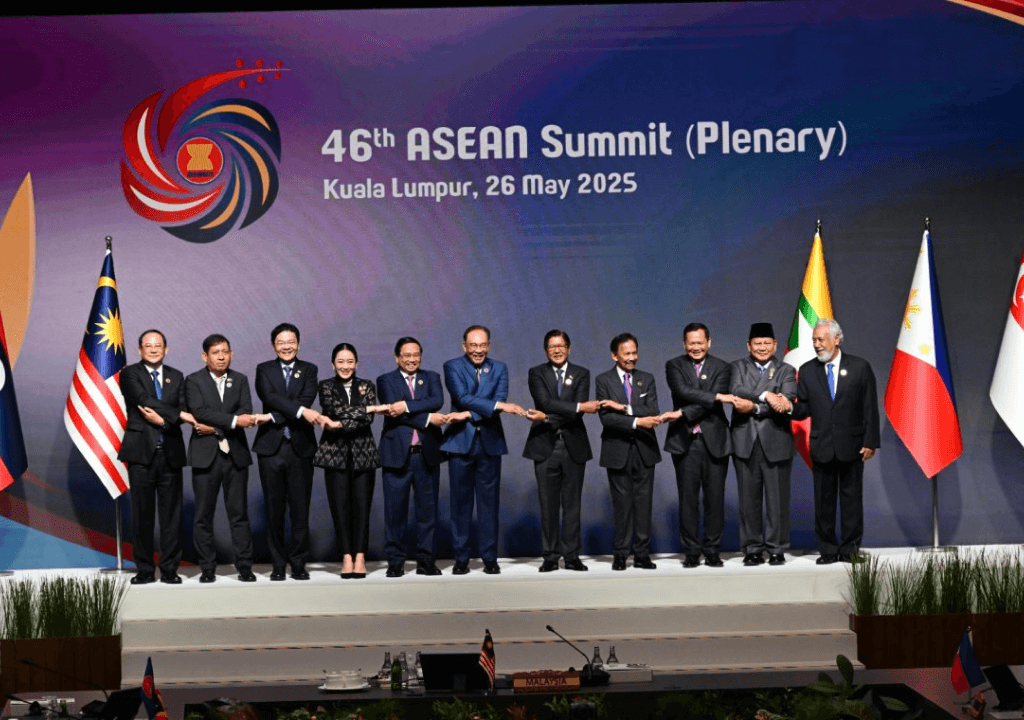Although the U.S. tariffs were eventually suspended, their initial implementation—widely seen as aggressive—posed a serious threat to all Southeast Asian nations, which rely heavily on exports. Countries across the region scrambled to strike deals with the United States, dispatching officials to Washington, making purchases, and doing everything possible to avoid penalties. Regardless of whether a country was a republic, communist state, or authoritarian regime, all sought relief from the tariffs.
This period triggered a growing realization that ASEAN needed to deepen its unity and coordination, particularly in trade negotiations—much like the European Union. While ASEAN remains one of the few functioning multinational bodies in the world, it has often struggled to act cohesively in moments of crisis due to its underdeveloped institutional framework. But now, amid an increasingly volatile global order, member states are coming to recognize that standing together is essential—or risk being exploited by larger powers.
This shift is clearly on display at the ongoing ASEAN annual summit in Kuala Lumpur, where Southeast Asian nations are pledging to present a united front amid mounting challenges, including economic pressures resulting from U.S. trade policies.
A unified bloc for a unified need
Malaysian Prime Minister Anwar Ibrahim opened the 46th annual summit of the Association of Southeast Asian Nations (ASEAN) by announcing his intention to lead a unified delegation to meet with U.S. President Donald Trump and address the escalating issue of American tariffs.
The tariffs could severely damage the region’s businesses, harm local economies. ASEAN countries, many of which rely heavily on exports to the United States, have been hit hard by the Trump administration’s tariff policies—ranging from 10% on Singaporean goods to as high as 49% on Cambodian exports. Although President Trump announced a 90-day suspension of tariffs in April for most countries and many reached a deal with the US, trade tensions have persisted. Several ASEAN member states remain particularly vulnerable due to their limited capacity to negotiate on equal terms, and pressure from China.
These pressures have made a coordinated ASEAN response more urgent than ever. Anwar emphasized that ASEAN’s peace, stability, and prosperity have long rested on an open, inclusive, and rules-based international system. He cautioned that these foundations are now under threat from arbitrary and unpredictable actions by major powers.
Officials expressed hope that a meeting with President Donald Trump could take place later this year. In the meantime, ASEAN has formed a geo economic task force to coordinate a collective response to the tariffs, while also allowing individual member states to continue bilateral negotiations. The organization includes major economies such as Indonesia, Singapore, Thailand, the Philippines, Vietnam and Malaysia, as well as smaller ones like Cambodia, Laos, and Myanmar. Unified front will help them all.
ASEAN seeks deeper integration
Together, ASEAN nations have real strength and value. Many of them share similar economic structures, and while they often compete in business, that rivalry can sometimes do more harm than good. By joining forces and exploring new markets together, they’ve already secured major trade deals with global powers like the United States, the European Union, India, and Japan. Now, that spirit of unity needs to be strengthened and formalized if they want to safeguard their economies and unlock future growth.
The bloc is now looking to deepen cooperation with the Gulf Cooperation Council (GCC). Anwar noted that the upcoming ASEAN leaders’ meeting with Chinese Premier Li Qiang and the GCC — the first of its kind — could open new avenues of collaboration to help shield ASEAN’s economy from global volatility. The GCC includes Bahrain, Kuwait, Oman, Qatar, Saudi Arabia, and the United Arab Emirates. These wealthy states could become ideal destinations for ASEAN exports.
Anwar also announced that ASEAN would unveil a new 20-year vision on Monday aimed at advancing economic and social integration — a step that would help the region become more equal partners with the GCC and Europe. And it’s not just Anwar advocating this path.
Malaysian Foreign Minister Mohamad Hasan echoed the call for stronger collaboration, urging Southeast Asian nations to accelerate regional economic integration, diversify their trade partnerships, and remain united in order to withstand the effects of widespread U.S. tariffs and global trade disruptions.
Singaporean Prime Minister Lawrence Wong, speaking on May 26, emphasized that ASEAN must intensify its efforts to deepen integration, especially as multilateralism and globalization come under increasing pressure. He highlighted the importance of strengthening external partnerships to ensure that ASEAN retains the strategic space and agency to shape its own future in an increasingly unstable world.
Will it happen?
As pressure from the U.S., China, and Europe continues to intensify, the importance of a unified ASEAN bloc is increasingly evident. Yet, building that unity remains a difficult task. One of the key hurdles lies in the diversity of political systems among member states. Unlike the European Union, which benefits from relatively uniform parliamentary structures, ASEAN comprises a broad spectrum: democratic states like Singapore, communist regimes like Vietnam, monarchies like Brunei, and military governments like Myanmar. These differences complicate negotiations.
Economic disparity among ASEAN nations presents another major challenge. While some countries have seen impressive economic growth, others still lag behind, creating a development gap that threatens to stall regional integration. Bridging this divide will require targeted investments and closer cooperation in infrastructure, education, and technology.
With global powers competing for influence in Southeast Asia, ASEAN must intensify its efforts for unity and strategic independence. Any fragmentation would leave the bloc increasingly exposed to external pressure. Trade disruptions—an issue shared by all member states—could become the driving force for greater cooperation. But without coordinated action, ASEAN risks slipping into irrelevance, reduced to just another ineffective regional body.








